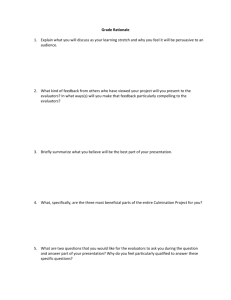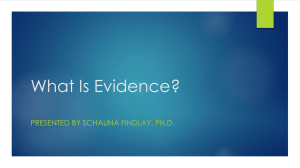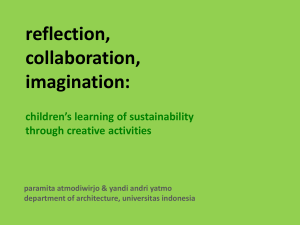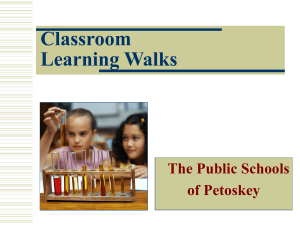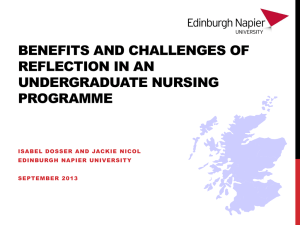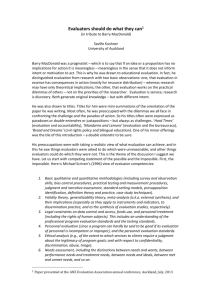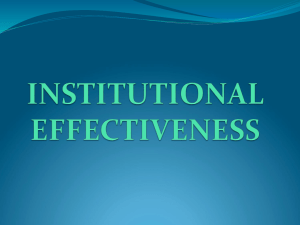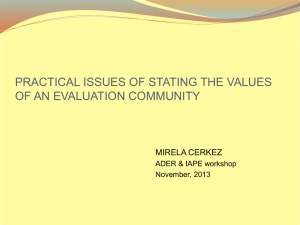How-to-Look-for-Evidence-in-Each-Domain-1
advertisement
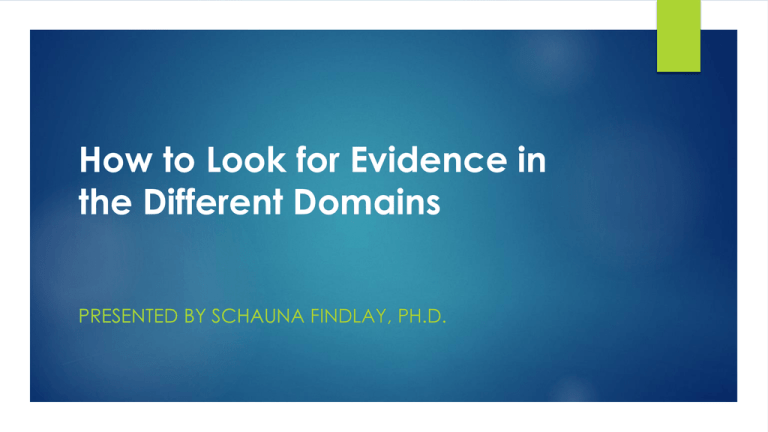
How to Look for Evidence in the Different Domains PRESENTED BY SCHAUNA FINDLAY, PH.D. Gathering and Categorizing Evidence Session Overview: Categorizing evidence collected for each domain is a necessary step, and sometimes we discover we didn’t, or can’t, gather enough evidence in our observations or in other activities throughout the year to make a judgment about a specific area. In this session, we will discuss ways and examples of evidence for each domain of collecting evidence (teachers and principals) share ways to categorize, evaluate, and present the results of evidence collected Observation of Teaching Observation of classroom practice, with the accompanying preconference and postconference, provides the best evidence of Domains 1, 2, and 3. The preconference, also called a planning conference, provides an opportunity for a teacher to display important planning skills, at least as used in planning a single lesson. The postconference, also called a reflection conference, is an important opportunity for teacher self-assessment, reflection on practice, and professional conversation—activities that have been demonstrated to contribute to professional learning by teachers. Observation of Professional Activities Faculty and team meeting engagement Parent conferences RTI or Child Study Team meetings Conduct Reflection Conferences from these Observations, too! Artifacts Pre-conference planning documents Unit plans Assignments/work for students to complete Student work Student assessments Post-conference reflection Grade books and data logs Class newsletter Phone log Letters to parents PT Conference Notes PD notes Evidence of Student Learning Standardized Test Results Student Learning Objectives Common Benchmark Results Unit Test Results Classroom Assessment Results Progress Monitoring Data A list of potential sources of evidence Evaluators should plan to take advantage of opportunities to collect evidence through certain events or meetings, such as homework workshops for parents or team analysis of benchmark data. Developing a list of dates, times, and the purpose of such opportunities will assist evaluators in creating a comprehensive but manageable plan for evidence collection. In crafting this list, evaluators should also consider what artifacts are readily available and already collected, such as a log of parent interactions. Creating this list will also reveal the types of evidence that are not currently being collected or tracked by educators or the school. Evidence Collection RISE Guidance and MORE http://www.riseindiana.org/sites/default/files/files/Evidence_Collection_Domains_1__3.pdf https://d.docs.live.net/ddf4a5cf50ae4385/Personal/Standard%20for%20Success/RISE%20evide nce%20for%20each%20domain.docx What other evidence do you, or would you like to, collect? Think-Write-Pair Share In what ways do you categorize, evaluate, and present the results of evidence collected from your observations and conferences? What strategies do you use to manage this task? Share your tips. CREATE A TO-DO LIST OF EVIDENCE YOU NEED TO ASK TEACHERS TO COLLECT TO KICK OFF NEXT YEAR Action Planning CREATE A TO-D0 LIST OF EVIDENCE YOU NEED TO COLLECT OR OBSERVE FOR NEXT YEAR ADD DATES FOR ANYTHING THAT IS TIME SENSITIVE
